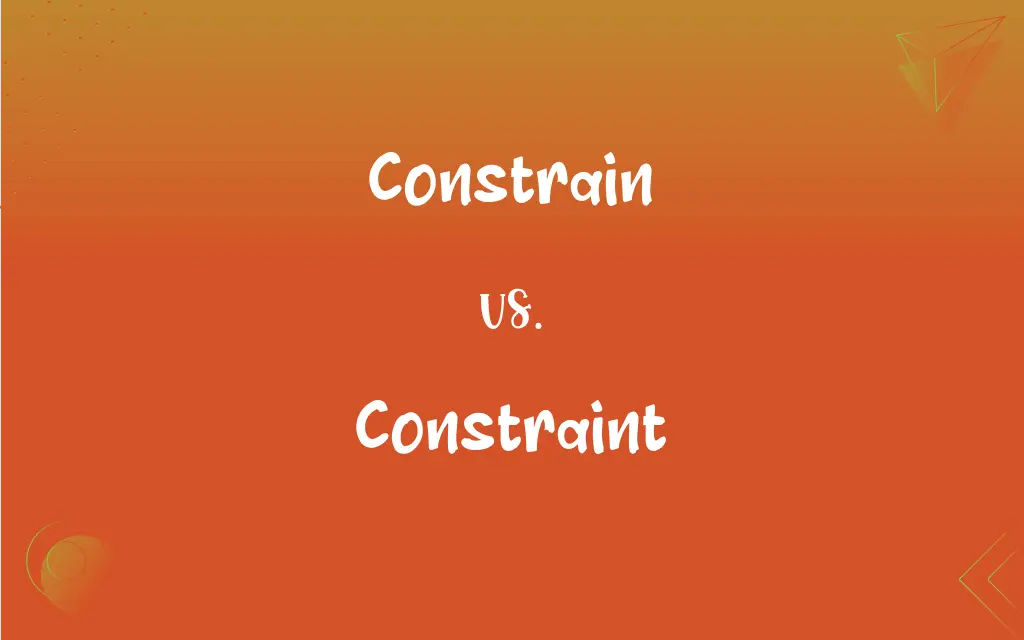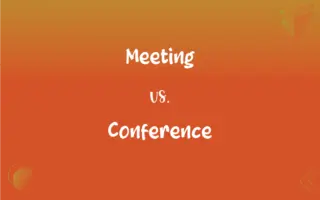Constrain vs. Constraint: What's the Difference?
Edited by Janet White || By Harlon Moss || Updated on November 15, 2023
"Constrain" is a verb meaning to compel or force someone to follow a particular course of action, while "constraint" is a noun referring to a limitation or restriction.

Key Differences
Constrain is an action verb, indicating the act of restricting or compelling someone or something to follow a certain path or to act in a specific way. A constraint is the condition of being restricted or the factor that limits or restricts someone or something. One involves action (to constrain), and the other refers to the state or condition resulting from this action (constraint).
Laws constrain behavior, meaning they impose restrictions on what individuals are allowed to do. On the other hand, a constraint is something that exists within a system or a set of rules, like a budget constraint, which limits how money can be spent.
When a software application fails to operate, it might be because the system's resources constrain it. Alternatively, a constraint in this context would be the actual limit on resources, like memory or processing power, that prevents the software from functioning properly.
Physical barriers constrain movement, such as fences that prevent people from entering certain areas. The constraints of these barriers are the limitations they impose on freedom of movement.
To constrain one's emotions is to control or hold them back, an action often necessitated by social norms or personal discipline. Emotional constraints are the forces or conditions that make such control necessary, such as the expectation to maintain composure in public settings.
ADVERTISEMENT
Comparison Chart
Part of Speech
Verb
Noun
Function
To compel or force
The state of being restricted
Usage in Sentence
"The rules constrain our options."
"There are constraints on our options."
Form
Action-oriented process
Condition or state resulting from being constrained
Example
Constraining growth
A constraint on growth
ADVERTISEMENT
Constrain and Constraint Definitions
Constrain
To compel or force.
The circumstances constrained her to make a hasty decision.
Constraint
A factor that restricts possibilities.
Lack of resources is a significant constraint.
Constrain
To limit or control.
She felt constrained by her family's expectations.
Constraint
State of being constrained.
The constraint of the regulations affected all companies.
Constrain
To restrict the activities or free movement.
High security measures constrained the flow of traffic.
Constraint
Physical limitation.
The small room was a constraint on their activities.
Constrain
To hold back or inhibit.
He constrained his anger during the argument.
Constraint
A limitation or restriction.
The main constraint of the project was its budget.
Constrain
To confine within bounds.
The athletes were constrained to the playing field.
Constraint
Psychological inhibition.
Social norms can act as a constraint on behavior.
Constrain
To keep within certain limits; confine or limit
"Legislators ... used the power of the purse to constrain the size of the military" (Julian E. Zelizer).
Constraint
The threat or use of force to prevent, restrict, or dictate the action or thought of others.
Constrain
To inhibit or restrain; hold back
"She noticed her mother blushing and acting somewhat constrained in her conversation with the grandmother" (David Huddle).
Constraint
The state of being restricted or confined within prescribed bounds
Soon tired of the constraint of military life.
FAQs
Can people be constrained by thoughts?
Yes, by limiting beliefs or fears.
Is gravity a constraint?
Yes, it limits movement.
What does constrain mean?
To force or compel within certain limits.
How do constraints affect decision-making?
They limit the available options.
Is a time limit a constraint?
Yes, it restricts duration for activities.
Do constraints lead to innovation?
They can inspire creative solutions.
What does constraint mean?
A limitation or restriction.
What's an example of a physical constraint?
A fence that limits access.
Can someone constrain themselves?
Yes, through self-discipline.
Can emotional constraints be harmful?
Potentially, if they prevent healthy expression.
Are constraints necessary in education?
Yes, they help maintain order and focus.
Is being constrained the same as being imprisoned?
Not necessarily; imprisonment is a severe form of constraint.
Can you give an example of a constraint in nature?
Predation is a constraint on prey populations.
Can technological advances remove constraints?
They can reduce or shift existing constraints.
Is constraint synonymous with control?
Control can be a form of constraint, but not all constraints are controls.
Can laws constrain people unfairly?
Some argue they can, depending on perspective.
Are constraints always negative?
Not necessarily; they can provide structure.
How does society constrain individual behavior?
Through laws and social norms.
How do budget constraints affect businesses?
They limit spending and investment.
How do constraints relate to freedom?
They are boundaries within which freedom is exercised.
About Author
Written by
Harlon MossHarlon is a seasoned quality moderator and accomplished content writer for Difference Wiki. An alumnus of the prestigious University of California, he earned his degree in Computer Science. Leveraging his academic background, Harlon brings a meticulous and informed perspective to his work, ensuring content accuracy and excellence.
Edited by
Janet WhiteJanet White has been an esteemed writer and blogger for Difference Wiki. Holding a Master's degree in Science and Medical Journalism from the prestigious Boston University, she has consistently demonstrated her expertise and passion for her field. When she's not immersed in her work, Janet relishes her time exercising, delving into a good book, and cherishing moments with friends and family.






































































